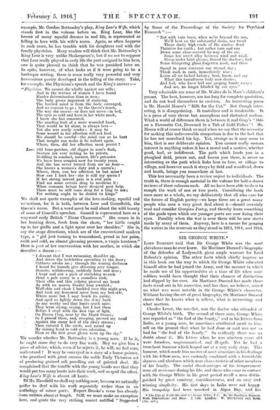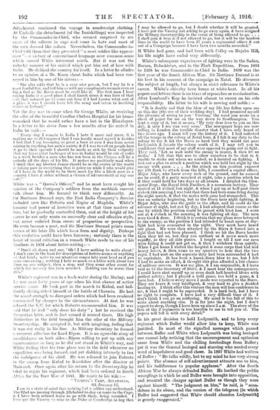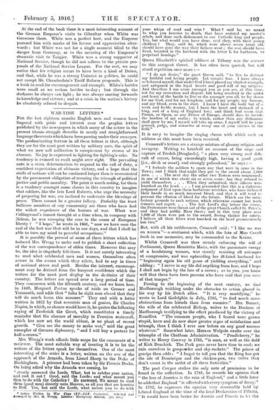SIR GEORGE WHITE.*
LORD ROBERTS said that Sir George White was the most chivalrous man he ever knew. Sir Mortimer Durand's biography of the defender of Ladysmith gives ample warrant for Lord Roberts's opinion. The other facts which chiefly impress -us in this book are the way in which Sir George White educated himself after he had joined the Army, and the manner in which he made use of his opportunities at a time of life when most- soldiers would have thought that their chances of distinction had slipped by for ever. Sir Mortimer Durand has made these facts stand out in his narrative, and has thus, we believe, seized on what was most notable in Sir George White's character. Without having the art of great biography, Sir Mortimer Durand shows that he knows what is salient, what is interesting, and what matters.
Charles Lever, the novelist, was the doctor who attended at George White's birth. The second of three sons, George White was regarded as " the fool of the family," and in his letters from India, as a young man, he sometimes attributed merit to him- self on the ground that what he had done or said was not so bad for " the fool of the family." So evidently there was no doubt about it. His letters when he was nineteen years old were formless, ungrammatical, and ill-spelt. Yet he had. a trenchant humour which leaped out at a very early stage. This humour, which made him master of most situations in his dealings with his fellow-men, was curiously combined.with a formidable shyness and aloofness which were characteristic of other members
of his family: The social disadvantages of his temperament -were -ail overcome during his life, and-those who -came in contact with Sir George White in Iris great period recall a Man distin-
guished by great courtesy, considerateness, and an easy and winning simplicity. His first days in India. were not. happy. His troopship had been wrecked in Algoa Bay, and his • Me IMO Field-A*104ot Sir Georg' V.C. By SR Mortimer Durand. With Iltwitrations and Mars. 2 vols. Loudon : W. Simi:wood sod 'Soils. [302. net.I detachment continued the voyage in nondescript. clothing. At lanballa the detachment (of the Inniskillings) was inspected by the Commander-in-Chief, who seemed surprised to see boan of the officers in caps and some in hats and most of 1 he men dressed like sailors. Nevertheless, the Commander-in- Chief told them that they presented " a most soldier-like appear-
ance "--a victory of conventional language over common-sense which caused White irreverent mirth. But it was not the unlucky manner of his arrival which put him out of love with India. He disliked the country foi itself. In a letter he alludes to an opinion of a Mr. Knox about India which had been con- veyed to hint by one of his sisters :-
" She also adds that he is a very nice person, but I say. ho is a most fearful liar, and tell him so with my compliments no man even as big.a fool as Mr. Knox must ho could like it. The first man I hear saying India is a good place I shall knock down it was liars of that sort. that induced me to come out here if I had known what sort of a place it was I should have left the army and taken to breaking stones in Ireland."
Yet the day was to come when Sir George White, on receiving the offer of the beautiful Caroline Chelsea Hospital for his home, reinarked that he would rather have a but in the Himalayas.
In a letter to his sister Jane a few months after his arrival in India he said :- "Every day I remain in India I hate it more and more, it is making me so ill-tempered that I can hardly stand myself & besides 1 feel that I am becoming as great a boor as ever I was from never mixing in anything but men's society & if I was to call on people here & go to their spreads I should bo made so sick by their vulgarity that my Liver (that. harbinger of woe in India) would be cut of order in a week besides a man who has not been in the Crimea will be a nobody all the days of his life. It makes me positively mad when I think that my brother James should be in the centre of the world a, taking part in everything that is going on while I who would give ell 1 have in the world to be there must fry like a black man in a eountry I hate & abhor without a chance of advancement of any ono sort.".
White was a " Queen's Officer," and he must have caught his opinion of the Company's soldiers from the snobbish current talk about hint. He learned to think very differently. As
air Mortimer Durand says, the East India Company's Service included men like -Roberts and Napiei of Magdala. ' • White's
humour and power of invective were at that. time masters of him, but he gradually controlled them, and at the height of his career he not only wrote an unusually clear and effective style,
but never suffered from errors of proportion or perspective. He even became a poet, and Sir Mortimer Durand prints some verses of his later life which have form and dignity. Perhaps
his evolution could have been foreseen; certainly there is the heart of sound criticism in a remark White Made to one of his brothers in 1858 about letter-writing :— " Don't sit down and say, 'Ohl I have nothing to write about.' I don't care in the least for descriptions of festive scenes or anything
that kind ; write to me whatever comes into your head as if you were conversing ; nothing I hate so much as a letter with about two lines on one subject, then a stop, and then some other event for which thememory has been wracked. Nothing can be worse than t his."
White's regiment was in a back-water during the Mutiny, and la was over forty years of age when his first chance of active service came. Ile took part in the march to Kabul, and bril- liantly diatingaishcd himself at the battle of Charasia. He had :lie moral strength to disregard orders which had been rendered eonsensicel by changes in the circumstances. At first he was refused the V.C. for which Roberts recommended him. It was said that he bad "only done his duty " ; but he received the aecoration later, and in fact earned it several times. His high dietinction in the field brought him the offer of the Military -;ecretaryship. He accepted it, but with misgiving, feeling that it was not really in his line. As Military Secretary he formed 74. reverent affect ion for Lord Ripon. It is an agreeable story of unselfishness on both sides-Atipon willing to put up with any inconvenience so long as lie did not stand in White's way, and White feeling that his true place was in the field whenever an expedition was being formed, and yet disliking intensely to tax the indulgence of his chief. He was released to join Roberts in the swoop from Kabul to Kandahar after the disaster at Maiwand. Once again after his return to the Secretaryship he tried to rejoin his regiment, which had been ordered to South Africa for the Boer War of 1881. He wrote to his wife " VICEROY'S CAMP, ALLARARAD, Oa January 81. .
.I am in a state of mind that nothing but a soldier can understand. The 92nd are passing through Allahabad to-day cn route to the Cape, &,I have been refused leave to go with them, being seconded. I li.tve got the Viceroy to wire to the Duke of Cambridge to beg that I may be allowed to go, but I doubt whether it will be granted. I have put the Viceroy out asking to go away again, & have resigned the Military Secretaryship in the event of being allowed to go. . . . I shall grin & bear it if not allowed to go, but it will be the hardest- lines in the ,world to have been 27 years a regimental officer & cut out of a Campaign because I have been two months seconded."
If White had gone, and had been with Colley on Majuba Hill, his life might have ended very differently.
White's subsequent experiences of fighting were in the Sudan, Burma, Baluchistan, and in the Zhob Expedition. From 1893 to 1898 he was Commander-in-Chief in India. 1899 was the first year of the South African War. Sir Mortimer Durand is at his best in his account of the campaign in Natal. He discusses the subject at length, but always in strict relevance to White's career. White's chivalry here burns at .white-heat. In all his papers and letters there is no trace of reproaches or recrimination. After Lombard's Kop lie insisted almost to excess on his sole responsibility. His letter to his wife is moving and noble :- " It is doubly sad that the blow of my life has fallen upon mo on this day [the eve of their wedding day}. I had promised myself tho pleasure of wiring to you Virettima the word you wrote on a sheet of paper for me on the way down to Southampton. You kept a copy of it, but it means, • My very dear love to you on this day, & may I Bee you very soon.' The newspaper boys are now estInno in London the terrible disaster that I have only heard of two hours ago. I must tell you the history of it. I had collected all the troops in the colony of Natal here, & I felt it my duty to the colony to try & hit the Boers so hard that they would not pass
Ladysmith invade the colony south of it. I . may tell you in confidence that most of my staff were opposed to going out to fight. They said, Let us wait until the enemy is nearer, & then let us strike.' I felt that- this was to allow ourselves to be shut in & unable to strike out where we wished, so I-insisted on fighting. I laid out a plan to attack a position which was held last night by the enemy with guns. . . . As the attack on this position exposed my left flank to attack from the hills, I consulted a capital officer, Major Adye, wbo knew every inch of the ground, and he assured me he could, if a party marched at night, take a position which he & they could hold for two days at all events. I detailed the Glou- cester Regt., the Royal Irish Fusiliers, & a mountain battery. They started at 11 o'clock last night, & when I got up at half-past three o'clock this morning I was told that there had been some firing during the night march, & that the mules with guns had stampeded. This was an unlucky beginning, but as the Boers hate night fighting, Be Major Adye, who was the guide in the affair, said he could do the advance at night, but not by day, I had adopted that course as the one by which the position could be gained with least loss. I went out at 4 o'clock in the morning & was fighting all day. Tho men were tired & done. I think it is certain that my plans were betrayed to the enemy, as the position I had intended to burst upon at days light had been evacuated in the night.- They must have heard our plans. We were then attacked by the Boers & forced into a fight that had not been planned. I think we hit the Boers harder than they hit us, but they can outflank us & move much more rapidly as they all ride ponies. I fought on till I saw our men were ailing & could not net on, & then I withdrew them quietly. When I got home I visited the hospital & some corps that had had heavy losses, & then came to my quarters to hear that the two rents. I had sent on the separate duty had been surrounded & had - to capitulate. It has been a knock-down blow to me, but I felt I had to make an effort, & thought this plan afforded a fair chance of military success. It was my plan, & I am responsible, & I have said so to the Secretary of State, & I must bear the consequences. I could have shut myself up or even dealt half-hearted blows with perfect safety ; but I played a bold game, too bold a game, & I have lost. I believe every move I made was reported to the Boers. They are bravo & very intelligent, do very hard to give a decided beating to. I think after this venture the men will lose confidence in me, & that I ought to be superseded. It is hard luck, but I have no right to complain. I have had a very difficult time of it. I don't think I can E,,o on soldiering. My mind is too full of this to write about anytlung else. It is far into the night, but I don't expect to sleep, though I have been up since 3 A.m. The story of the fate of the 2 regiments is too horrible to me to tell you of. The papers will tell it with every detail."
In his great decision to hold Ladysmith, and to keep every regiment which Buller would allow him to keep, White was justified. In most of the signalled messages which passed between Buller and White when Ladysmith was being besieged one cannot help noticing that the encouragement and optimism came from White and the chilling forebodings from Buller; yet it was the General besieged and starving who needed every word of hopefulness and good cheer. In 1897 White had written of Buller : " He talks wildly, but to my mind he has very strong points. The absence of self-advertisement attracts one to him, and his indifference to popular applause." After the South African War he always defended Buller. He loathed the publics wranglings in which he and Buller were brought into opposition, and resented the charges against Buller as though they were against himself: " The judgment on him," he said, is " scan. dalous in its abuse, and the version of the telegram [in which Buller had suggested that White should abandon Ladysmith] is grossly exaggerated."
At the end of the book there is a most interesting account of the German Emperor's visits to Gibraltar when White was Governor there. White was a perfect host, and the Emperor pursued hint with marks of his favour and appreciation after- wards ; but White was not for a single moment blind to the danger from Germany, or to the meaning of the Emperor's dramatic visit to Tangier. White was a strong supporter of National Service, though he did not adhere to the precise pro- posals of the National Service League. For the rest, we may notice that his religion seems to have been a kind of Deism, and that, while he was a strong Unionist in politics, he could not accept Mr. Chamberlain's Tariff Reform proposals. This is a book to read for encouragement and example. White's battles were small as we reckon battles to-day ; but through the darkness he always saw light ; he was always moving forwards in knowledge and virtues ; and at a crisis in the nation's history Le absolutely refused to despair.




































 Previous page
Previous page